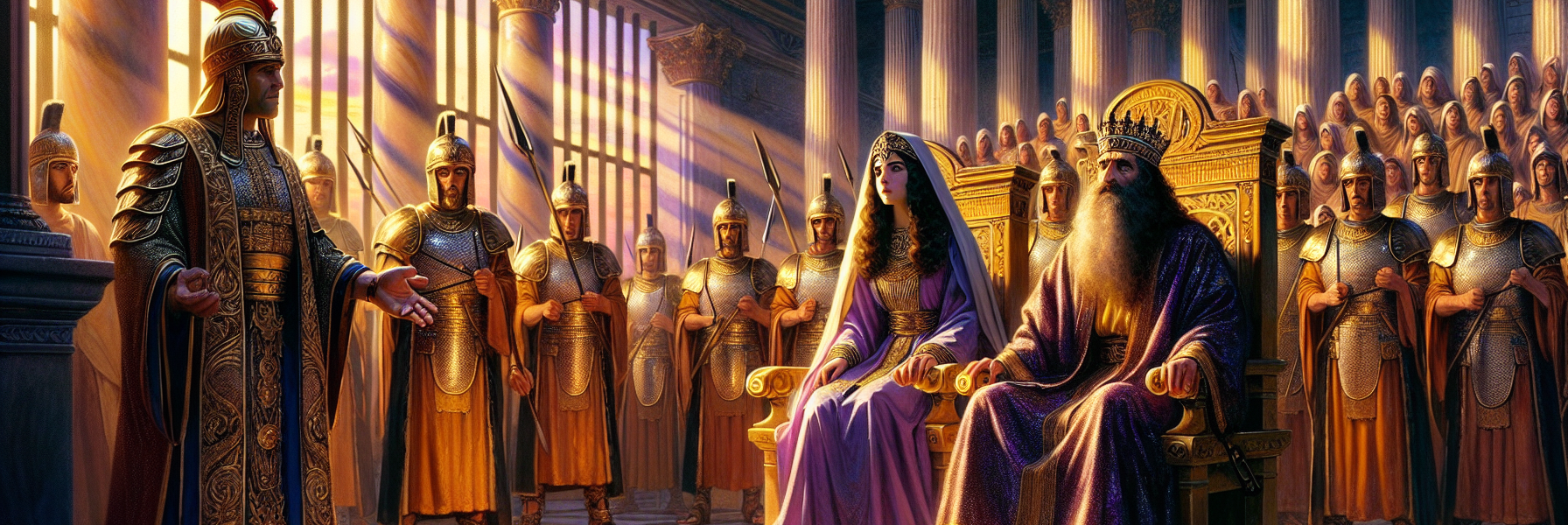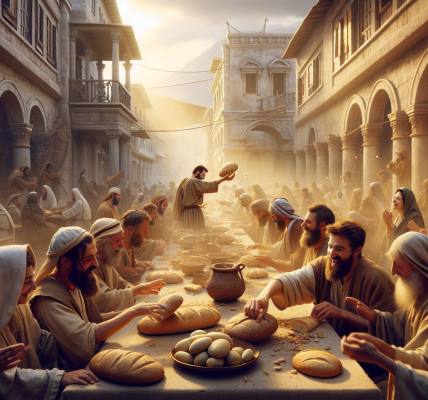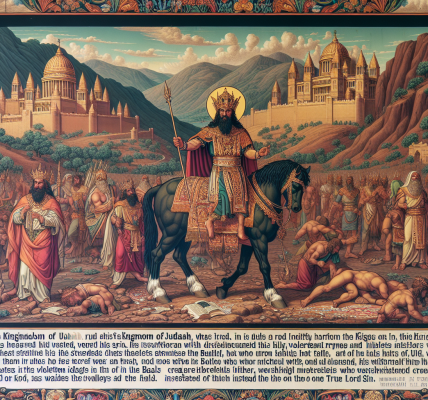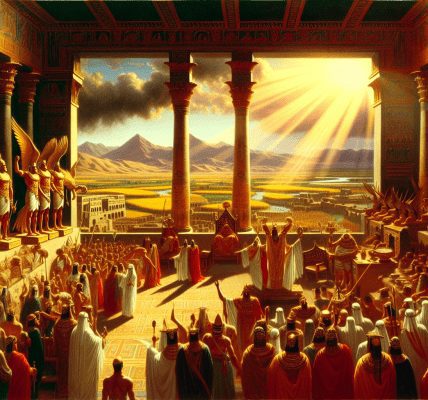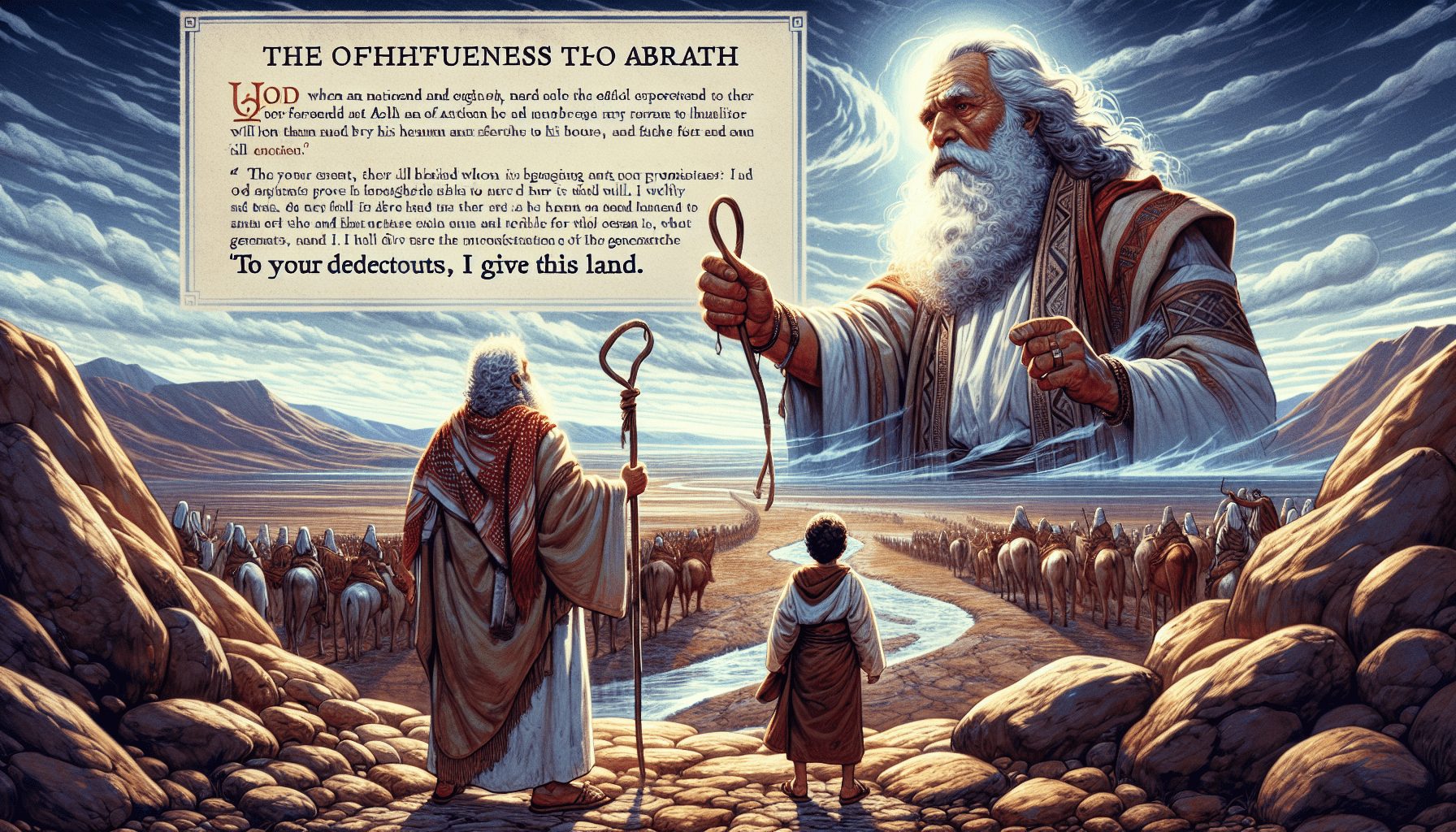**The Defense Before Kings**
The sun hung low over Caesarea, casting long shadows across the marble halls of Herod’s palace. The air was thick with the scent of salt from the nearby sea, mingling with the perfumed oils of noble guests. Soldiers in polished armor stood at attention, their spears glinting in the fading light. Inside the grand audience chamber, King Agrippa and his sister Bernice took their seats upon elevated thrones, their robes shimmering with threads of gold and purple. Before them stood a man in chains—Paul of Tarsus, his face weathered by years of travel and hardship, yet his eyes burned with an unquenchable fire.
Governor Festus, seated nearby, gestured toward the prisoner. “King Agrippa,” he began, “this is the man about whom the whole Jewish community has petitioned me, both in Jerusalem and here, shouting that he ought not to live any longer. But I found he had done nothing deserving death, and since he himself appealed to the Emperor, I decided to send him. Yet I have nothing definite to write to our sovereign about him. Therefore, I have brought him before all of you, and especially before you, King Agrippa, so that after we examine him, I may have something to write.”
Agrippa, a man well-versed in Jewish customs, leaned forward with interest. “You have permission to speak for yourself,” he said to Paul.
Paul raised his manacled hands slightly, the chains clinking softly, and took a deep breath. Then, with a voice both steady and fervent, he began.
“King Agrippa, I consider myself fortunate to stand before you today to defend myself against all the accusations of the Jews, especially because you are well acquainted with all the Jewish customs and controversies. Therefore, I beg you to listen to me patiently.”
The room fell silent. Even the murmurs of courtiers ceased as Paul’s words filled the space.
### **A Pharisee of Pharisees**
“My manner of life from my youth, spent from the beginning among my own people and in Jerusalem, is known by all the Jews,” Paul declared. “They have known for a long time, if they are willing to testify, that according to the strictest sect of our religion, I lived as a Pharisee.”
He paused, letting the weight of his past settle upon his listeners. The Pharisees were known for their rigid adherence to the Law, and Paul had been among their most zealous.
“And now I stand on trial because of my hope in the promise God made to our ancestors—a promise that our twelve tribes hope to attain as they earnestly serve God day and night. It is for this hope, O King, that I am accused by Jews! Why should any of you consider it incredible that God raises the dead?”
### **The Persecutor Transformed**
Paul’s voice grew heavier as he recounted his past. “I myself was convinced that I ought to do all that was possible to oppose the name of Jesus of Nazareth. And that is just what I did in Jerusalem. On the authority of the chief priests, I put many of the Lord’s people in prison, and when they were put to death, I cast my vote against them. I punished them often in the synagogues and tried to make them blaspheme. In my obsession against them, I even went to foreign cities to persecute them.”
His hands trembled slightly, not from fear, but from the raw memory of his former life.
“On one of these journeys, I was going to Damascus with the authority and commission of the chief priests. About noon, O King, as I was on the road, I saw a light from heaven, brighter than the sun, blazing around me and my companions. We all fell to the ground, and I heard a voice saying to me in Aramaic, ‘Saul, Saul, why do you persecute me? It is hard for you to kick against the goads.’”
Paul’s voice dropped to a whisper, as if he were once again standing on that dusty road, blinded by divine radiance.
“I asked, ‘Who are you, Lord?’ And the Lord replied, ‘I am Jesus, whom you are persecuting. Now get up and stand on your feet. I have appeared to you to appoint you as a servant and as a witness of what you have seen and will see of me. I will rescue you from your own people and from the Gentiles. I am sending you to open their eyes and turn them from darkness to light, and from the power of Satan to God, so that they may receive forgiveness of sins and a place among those who are sanctified by faith in me.’”
### **Obedience to the Heavenly Vision**
“Therefore, King Agrippa,” Paul continued, his voice rising with conviction, “I was not disobedient to the heavenly vision. I preached first to those in Damascus, then in Jerusalem and throughout Judea, and also to the Gentiles, that they should repent and turn to God, demonstrating their repentance by their deeds. That is why some Jews seized me in the temple courts and tried to kill me.”
He spread his hands, the chains rattling. “But God has helped me to this very day, so I stand here testifying to small and great alike, saying nothing beyond what the prophets and Moses said would happen—that the Messiah would suffer and, as the first to rise from the dead, would bring the message of light to his own people and to the Gentiles.”
### **A Challenge to the King**
Festus, who had been listening with growing agitation, suddenly burst out, “You are out of your mind, Paul! Your great learning is driving you insane!”
Paul turned to him calmly. “I am not insane, most excellent Festus. What I am saying is true and reasonable. The king knows about these things, and I can speak freely to him. I am convinced that none of this has escaped his notice, because it was not done in a corner.”
Then he fixed his gaze on Agrippa. “King Agrippa, do you believe the prophets? I know you do.”
Agrippa shifted uncomfortably. The weight of Paul’s words pressed upon him. After a moment, he replied, “Do you think that in such a short time you can persuade me to be a Christian?”
Paul’s eyes softened. “Short time or long—I pray to God that not only you but all who are listening to me today may become what I am, except for these chains.”
### **The Verdict of Innocence**
The king rose, and the assembly followed suit. As they withdrew to deliberate, murmurs filled the chamber. Agrippa turned to Festus. “This man is doing nothing that deserves death or imprisonment.”
Festus nodded. “He could have been set free if he had not appealed to Caesar.”
And so, Paul remained bound, yet his words lingered in the hearts of those who heard them—words of truth, of transformation, and of a light that no chains could extinguish.
